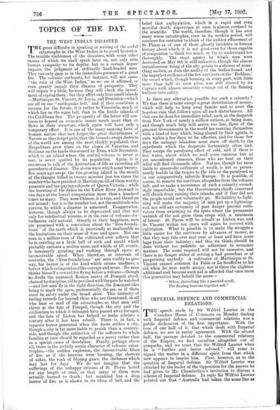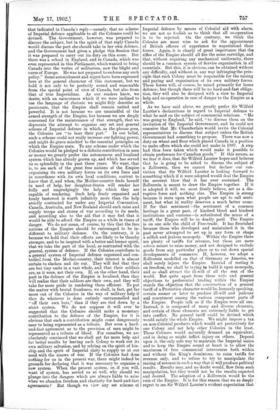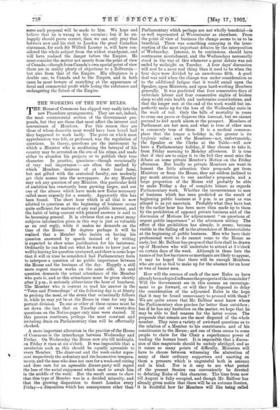IMPERIAL DEFENCE AND COMMERCIAL RELATIONS. T HE speech made by Sir
Wilfrid Laurier in the Canadian House of Commons on Monday dealing with Imperial defence and commercial relations was a public declaration of the first importance. With the tone of one half of it, that which dealt with Imperial defence, we are in entire agreement. With the second half, the passage devoted to the commercial relations of the Empire, we find ourselves altogether out of sympathy, and we trust that Sir Wilfrid Laurier when he is " further and better advised " will come to regard the matter in a different spirit from that which now appears to inspire him. First, however, as to the question of Imperial defence. Sir Wilfrid Laurier was attacked by the leader of the Opposition for the answer he had given to Mr. Chamberlain's invitation to discuss a scheme of Imperial defence. In reply Sir Wilfrid Laurier pointed out that " Australia had taken the same line as that indicated in Canada's reply—namely, that no scheme of Imperial defence applicable to all the Colonies could be devised. The Government, however, was prepared to discuss the subject, but in the spirit of that reply Canada would discuss the part she should take in her own defence, and the Government had given a pledge this Session that it was prepared to carry out its duty on this score. But there was a school in England, and in Canada, which was even represented in this Parliament, which wanted to bring Canada into the vortex of militarism, now the blight and curse of Europe. He was not prepared to endorse any such policy." Some astonishment and regret have been expressed here at the general character of this statement, but we hold it not only to be perfectly sound and reasonable from the special point of view of Canada, but also from that of true Imperialism. As our readers know, we desire, with an earnestness which if we were inclined to use the language of rhetoric we might fitly describe as passionate, that the Empire shall remain united and powerful. It is not because we are unmindful of the armed strength of the Empire, but because we are deeply concerned for the maintenance of that strength, that we deprecate the attempt to organise any set and general scheme of Imperial defence in which, as the phrase goes, the Colonies are " to bear their part." In our belief, such a scheme could not really increase our fighting power, and might do grave mischief to the essential principles on which the Empire rests. To any scheme under which the Colonies would be pledged to a definite contribution in men or money we greatly prefer the autonomous and localised system which has already grown up, and which has served us so splendidly in the past three years. We want, that is, to see each of the great free nations of the Empire organising its own military forces on its own lines and in :accordance with its own local conditions, content to know that if, and when, the Mother-country finds herself in need of help, her daughter-States will render her fully and ungrudgingly the help which they are capable of rendering. Such help freely organised and freely bestowed is worth infinitely more than the help strictly contracted for under any Imperial Convention. Canada, Australia, and New Zealand should each raise and supply troops and stores of war according to its needs, and according also to the aid that it may feel that it would be able to afford the Empire as a whole in times of danger. We do not mean, of course, by this that the free nations of the Empire should be encouraged to be in- different to military defence. On the contrary, it is :because we hold that their efforts are likely to be thereby stronger, and to be inspired with a better and keener spirit, that we take the part of the local, as contrasted with the general, system of defence. If the Colonies contribute to .a general system of Imperial defence organised and con- trolled from the Mother-country, their interest is almost certain to slacken and die out. They will feel that they are but tiny units in a vast whole, and that their soldiers are, as it were, not their own. If, on the other hand, their part in the defence of the Empire is localised, then they will realise that their soldiers are their own, and they will take far more pride in rendering them efficient. To put the matter with brutal frankness, we shall, in fact, get far more out of the Colonies in the way of military help if they do whatever is done entirely untrammelled and " off their own bats," than if they are tied down by a strict system. We do not suppose it will ever be suggested that the Colonies should make a monetary contribution to the defence of the Empire, for it is obvious that such a contribution might come dangerously near to being represented as a tribute. But even a hard- and-fast agreement as to the provision of men might be represented as a tribute of blood. For ourselves, we are absolutely convinced that we shall get far more help and far better results by leaving each Colony to work out its own military salvation, and by relying on the spirit of kin- ship and the spirit of Imperial unity to supply us at our need with the sinews of war. If the Colonies had done nothing for us in the present war, there might indeed be grounds for declaring that it was necessary to organise a new system. When the present system, or, if you will, want of system, has served us so well, why should we plunge into the dangers which are always liable to arise when we abandon freedom and elasticity for hard-and-fast agreements ? But though we view any set scheme of Imperial defence by means of Colonial aid with alarm, we are not so foolish as to think that all co-operation is to be rejected. On the contrary, we think the Colonies are most wise to ask for the appointment of British officers of experience to superintend their forces. Again, it is clearly of great importance that the rifles of the Empire should all fire the same cartridge, and that, without requiring any mechanical uniformity, there should be a common system of Service organisation in all essentials. But this, it is obvious, can be obtained without any difficulty, and without in any way infringing the prin- ciple that each Colony must be responsible for the raising and paying and organisation of its own military forces. Those forces will, of course, be raised primarily for home defence; but though there will be no hard-and-fast obliga- tion, they will also be designed with a view to Imperial help and co-operation in case of danger to the Empire as a whole.
As we have said above, we greatly prefer Sir Wilfrid Laurier's declarations in regard to Imperial defence to what he said on the subject of commercial relations. " Ho was going to England," he said, " to discuss them on the invitation of the Imperial Government, and he could not conceive that Mr. Chamberlain would invite the Colonial representatives to discuss that subject unless the British Government had something to propose. There was now a duty on wheat and flour which placed Canada in a position to make offers which she could not make in 1897. A step had thus been taken which would make it possible to obtain preference for Canadian goods." If this means, as we fear it does, that Sir Wilfrid Laurier hopes and believes that he is going to be asked to discuss the subject of a Zollvereiu, then we cannot but declare our con- viction that Sir Wilfrid Laurier is looking forward to something which if it were adopted would deal the Empire the severest blow that it has ever sustained. The Zollverein is meant to draw the Empire together. If it is adopted it will, we most firmly believe, act as a dis- ruptive force and nothing else. The Empire is strong because it rests upon what people are apt to call senti- ment, but what in reality deserves a much better name. If for that sentiment—the sentiment of a common heritage in a great past, of kindred blood and kindred institutions and customs—is substituted the nexus of a tariff, the Empire will be in deadly peril. The Empire is ou one side the child of Free-trade. It has flourished because those who developed and maintained it in the past never attempted to set up in any form or shape a selfish and jealous monopoly. Within the Empire there are plenty of tariffs for revenue, but these are mere octrois meant to raise money, and not designed to exclude goods from any particular place or to cut down special developments of commerce. If, however, we adopt a Zollverein modelled on that of Germany or America, we shall surely injure the Empire. Instead of resting it on freedom, we shall be trying to build it upon monopoly, and so shall attract the of all the rest of the world. But quite apart from these wide and general objections to preferential trading within the Empire stands the objection that the construction of a general tariff of a Protective character would be, humanly speaking, certain sooner or later to produce and jealousy anti resentment among the various component parts of the Empire. People talk as if the Empire were all one. Instead, it is composed of many and diverse elements. and certain of these elements are extremely liable to get into conflict. No general tariff could be devised which would satisfy the whole Empire. We might impose a tax on non-Colonial products which would act protectively for one Colony and not help other Colonies in the least. Those Colonies would naturally demand an equivalent, and in doing so might inflict injury on others. Depend upon it, the only safe way to maintain the Imperial union and to keep the Empire sound at heart is to allow the maximum of free commercial intercourse both within and without the King's dominions, to raise tariffs for revenue only, and to refuse to try to manipulate the raising of revenue in such a way that it will produce political results. Results may, and no doubt would, flow from such manipulation, but they would not be the results expected and desired. The adoption of a Zollverein would be the ruin of the Empire. It is for this reason that we so deeply regret to see Sir Wilfrid Laurier's evident expectation that ' some such proposal will be made to him. We hope and believe that he is wrong in his surmise; but if he ma- happily should prove correct, then we can only pray that between now and his visit to London the great Canadian statesman, for such Sir Wilfrid Laurier is, will have con- sidered the whole subject from the widest standpoint, and will have realised the danger before the Empire. He must consider the matter not merely from the point of view of Canada—though from Canada's own special point of view there are in reality plenty of objections to a Zollverein- but also from that of the Empire. His allegiance is a double one, to Canada and to the Empire, and in both cases he must beware of snatching at the appearance of fiscal and commercial profit while losing the substance and endangering the future of the Empire.








































 Previous page
Previous page